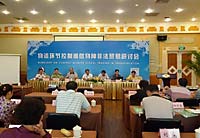Chinese in Africa told “Don’t buy illegal ivory”
Beijing, China, 19th August 2011—TRAFFIC and the China Wildlife Conservation Association (CWCA), are targeting Chinese nationals living in Africa with their message not to bring ivory and other illegal wildlife products into China.

A series of Chinese-language broadcasts on “Stop the illegal trade in ivory” are being aired throughout Africa between July and the end of August by China Radio International (CRI).
TRAFFIC’s work with CRI and CWCA is supported by a grant from the US Fish and Wildlife Service.
As the number of Chinese nationals living and visiting Africa has increased in recent years—several hundred thousand Chinese workers currently live in Africa, working in a variety of industries including mining, forestry and infrastructure development—so has the frequency of cases in which Chinese nationals have been found illegally transporting ivory and other wildlife products to China.
A typical example occurred last month, when Huanggang Customs in Shenzhen, Guangdong Province caught a man illegally entering China with 3.5 kg of ivory products from Africa.
The radio broadcasts aim to counteract the basic lack of awareness among Chinese citizens about the illegality of transporting ivory and the consequences of being caught.
Some people claim not to know it is illegal and others believe that if caught, they only face having the goods confiscated.
But, as the radio programmes highlight, the consequences of smuggling ivory are far more serious, with anyone found guilty facing anything between 5 years and permanent imprisonment under Chinese Criminal Law.
“The open sale of ivory in illegal domestic markets in parts of Africa may give the false impression it can be legally purchased, but buyers should be aware they could end up behind bars for years,” said Jianbin Shi, Head of TRAFFIC’s China programme.
Regulations governing the import and export of ivory and other wildlife products between Africa and China are covered in detail during the radio broadcasts, including those under the Convention on International Trade in Endangered Species of Wild Fauna and Flora (CITES).
Earlier this week, a report on Status of elephant populations, levels of illegal killing and the trade in ivory, co-authored by TRAFFIC revealed the escalating levels of illegal ivory trade and poaching of elephants was presented to government delegates at the 61st meeting of the Standing Committee to CITES.
Meanwhile, some of the methods used to transport ivory and other illegal wildlife products were the subject of a workshop on “Control of illegal trade in endangered species during transportation” held earlier this month in Kunming, Yunnan Province, China.
The workshop was organized by TRAFFIC in collaboration with the Kunming Branch of China’s CITES Management Authority and was held in response to the rising number of cases where illegal wildlife products have been found during their transportation between locations.
Representatives from Yunnan provincial Departments of Forestry, Commerce, Industry and Commerce, the Post Office, Tourism and Wildlife Conservation, along with enforcement officers from Kunming Office of CITES MA, Yunnan Forest Police, and Customs attended, plus representatives from 18 companies involved in transportation of goods and international travel agencies.
In 2009, China’s Customs agency detected around 860 cases of smuggling of endangered species products, almost 800 of them elephant tusks or ivory products.
Logistics companies too have witnessed a rise in the number of cases of illegal transportation of wildlife products, with often large quantities of protected items such as ivory, skins of Asian big cats, pangolin scales and antelope horns discovered.
According to TRAFFIC, many problems derive from a lack of awareness in the rapidly developing logistics industry in China, with staff at relevant companies unaware about the rules governing endangered species contributing to the problem.
The rapid development of e-commerce means logistics companies have become a key conduit for detecting and preventing illegal transactions of wildlife goods.
The onus is being placed on logistics companies to ensure they are not unwitting parties to such crime, with the threat of legal action and prosecution for any failing to take appropriate action.
“This is a very timely and highly informative workshop, which helped us to gain an understanding of the national and international laws and regulations governing trade in endangered species,” said a representative of Shun Feng Express (a major Chinese logistics company).
“We will co-operate with the Management Authorities and strengthen our in-house rules to tackle all kinds of illegal trade in wildlife and contribute towards the sustainable use of natural resources.”
Workshop participants agreed that relevant Authorities, such as Forestry, Industry and Commerce, Customs, Postal and Communications workers, should collaborate to provide technical advice to the logistics industry on the transportation of wildlife goods. In addition, legal statutes on certain aspects of wildlife transportation urgently need to be established.
A Travellers' Guidance leaflet co-produced by the National Tourism Administration (NTA), China CITES Management Authority, and TRAFFIC ahead of the 2010 football world cup to remind Chinese tourists not to buy or to bring back endangered wildlife products.




